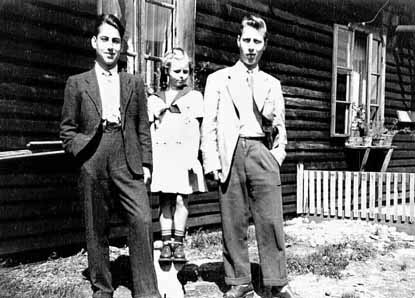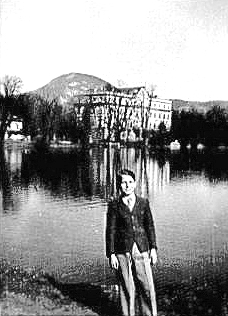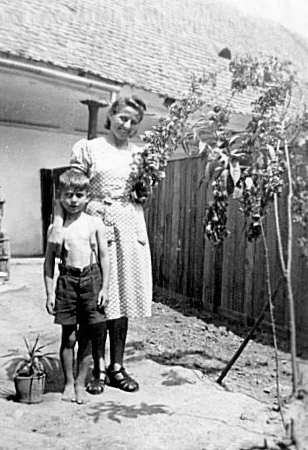Austrian archives - https://www.oesta.gv.at/bezirks-stadt-und-kommunalarchive
Parsch, rund um Mauracherstrasse; Land Salzburg, US zone Team 318, Kapuzinerberg-Fuss; Box 11, Jews, Ukrainians,
http://www.ghi-dc.org/guide5/frame2.html
Archive: Salzburger Landesarchiv
Michael Pacher Str. 40
A-5020 Salzburg
Tel.: (0662) 20541
See Oberösterreichisches Landesarchiv See Linz.
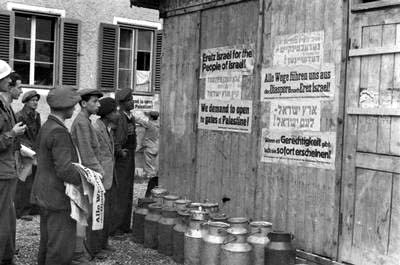 Parsch DP camp Hebrew announcements; source: Yad Vashem
Parsch DP camp Hebrew announcements; source: Yad Vashem
Dear Olga
I do hope you can help me. My husband was born in Russia. From approx 1945 to
1956 he spent his entire childhood in a Displaced Persons' Camp. The name was
Lager Parsch, located on the Salzburg River. The VonTrapp family home could
be seen across the river.
It was a captured German Barracks. My husband remembers quite a bit--but would like to see maps of the area to see if he remembers well. The Red Cross did go there. He remembers the mountains--food was scarce--there was a soccer field at the camp and a garden that the families could tend. Any assistance from you would be greatly appreciated Thank You Luci Lebedew
Follow-up:
Dear Olga!
The search is still on!!! I received maps from Library of Congress--Bill found
the Camp!--Also due to this, he had memories of a Jewish Camp Weichselbaum
Siedlung---also the first Camp that his family arrived at in Austria---Foltzgarten (sp)--now
I need to look that one up!!!!! The UN site has photos which will be forwarded--Thank
You for your suggestions! Again THANK YOU Luci
Lebedew
Olga's reply: See
Volksgarten.
On 7/21/08 Dear
Olga,
Just found this site by accident, and
am looking for photos of a DP Camp, PARSCH,
which was in Salzburg Austria after the war.
I don’t know how this picture was saved in our family, but my entire family and I, lived in this camp till our immigration to the US in 1951.
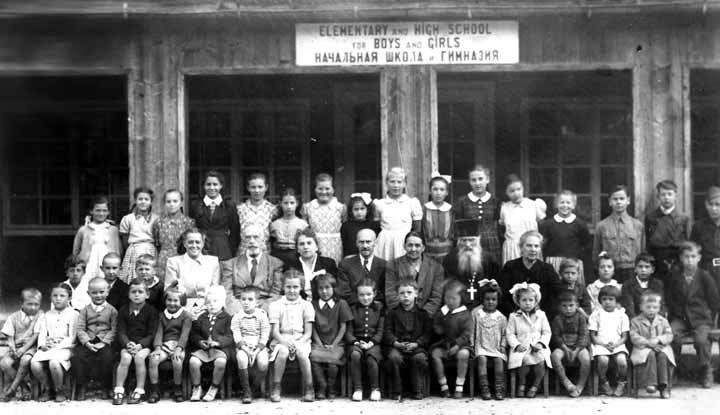
That is me, in the second row second from the left.
Thank you for the great work you are doing in providing such vital
records for the millions that suffered through those times.
Best regards, Paul Tschausoff paul450@bellsouth.net
Parsch Sanatorium, at Russen, Land Salzburg (U.S. zone 318
Parschlugerstrasse - Kapfenberg; British zone;
Passage - Innsbruck
Pebalweg - Leoben; British zone
Peggau - Concentration Camp; British zone
Olga
Two years ago I visited a man in Peggau, he had a exhibition about his own
paintings and suddenly a friend of his and he told me about a camp in Peggau. I was surprised to listen from the past. The people there must work very, very hard with stones. Herta
Peggetz camp in Lienz , Austria, Team 331; Ukrainians
City archive: Stadtarchiv, A-9900
Lienz,
Museum Schloss Bruck
Tel. (04852) [0043 4852] 62580
Municiple office: Stadtgemeindeamt
Lienz
Hauptplatz 7
A 9900 Lienz
Tel: 0043 4852 600 - 0
Fax: 0043 4852 600 - 411
Email: rathaus@stadt-lienz.at
Dear Olga
My husband has accidentally stumbled onto your website - how comforting to know
that there are many in the same predicament as myself - searching for pieces
of a puzzle with very little to go on.
I know that I was born in Peggetz camp in Lienz Austria in 1946 - at that time I had a sister aged 12 and a brother aged 11 who, after my mother's passing, revealed to me the full story of our time in Austria; a time when people embraced each new day with a hope for a better future for themselves and their children. So many families torn apart by the ravages of war, some lucky enough to be re-united with loved ones - others having to create new beginnings and sadly, some never speaking about the hardships they endure.
For some five years now my husband and I have instigated searches through the Red Cross for my birth father Michael Krassov/Krassnov (spelling could differ) - my brother and sister are not sure which of the names was correct - nor do we have any dates of birth, country of origin etc. Michael left Peggetz camp, Lienz in 1946 after learning that his wife and child/children were in another camp in Austria or Germany (details also not known). We were eventually repatriated to Australia and arrived here from Naples, Italy in 1949.
I would dearly love to find my father's family - just to put the puzzle altogether and to learn of their own story. If there is anyone out there who can give me a lead on ships and passenger lists or any records of names and countries of repatriation. Thank you and will keep searching. NADIA OWEN (SHEVCHENKO)
Olga's reply: Check this web page out: http://members.iinet.net.au/~tpsoft/index.html
1/16/2014 Hi Olga,
My parents were born in Slovenia, they flight with my grandparents in May 1945 through the Loibltunnel to Carinthia and stayed with 20.000 Slovenians on the fields in Viktring, when the British military promised to bring them to Italy. But the trucks go back to Yugoslavia and more than 12.000 Slovenian were murdered.
On June 29th, 1945, all refugees came from Viktring to DP camps in Spittal, St. Veit and Lienz/Peggetz. My father (12 years old) came with the first train to Spittal, my mother (8 years) came to Lienz and in November 1946 with all the other refugges from Lienz to Spittal.
My parents are still living in Spittal and are helping everybody, who wants to know something about the living in the DP camps near Spittal. There were camps in Treffling/Seeboden, in Seebach/Seeboden für TBC patients, in Feffernitz (german-speaking refugees), Kellerberg (Hungarian), Villach/St. Martin and specially in Spittal and Lienz/Peggetz. They help to get birth documents, to find the grave of grandparents, to show the locations.
On your website the DP camp Peggetz/Lienz is named for Slovenian, but all informations and fotos are from the Cossacks, the Cossacks cemetery and their meetings every year.
This camp was built in 1938 and was a camp for POW. In the days 5 – 8th May 1945 there came the Cossacks from Italy (Tolmezzo – Timau – Plöckenpass – Lienz), maybe there were more than 40.000 Cossacks in the Drau valley, soldiers with wives, children and horses.
On June 1st, 1945 and the next days, the British military force them to get in the train – to send them back to the Russian cone at the bridge in Judenburg. The camp got empty.
On June 29th, trains stopped again near Peggetz. They brought more than 2000 Slovenians to stay in this camp for more than 16 months. Than they were brought to the DP camp in Spittal an der Drau.
Now this area is an industry area. The Cossacks were here only 4 weeks, and the people in Lienz know the story of the massacre. But it is hard to find somebody who nothing about Slovenian in Lienz/Peggetz.
This are only the essential informations.
We will be glad to get reactions from all over the world, especially from Slovenian refugees and there descendants. We also organized sightseeing tours in Carinthia and PowerPoint presentations about living in the DP camps.
Sincerly
Johanna Kronawetter, born Starman johanna.kronawetter@aon.at
www.nakul.biz
Pestalozzistrasse - Villach; British zone;
Petertalstrasse - Graz; VIII., St. Peter, barracks, British zone;
Peuerbach - camp 901; S zone;
Pferdelazarett - US zone; see Rositten
See Rosittenlager, Rosittenkasern,
See Saltzburg archives.
Archiv der Stadt Salzburg mit Archiv des Salzburger Museums Carolino-Augusteum, Schloss [castle],
Museumsplatz 6,
5010 Salzburg
Piccolo - Purtscherstrasse, Villach, British zone
Pichling - Köflach; British zone;
Picostrasse - Villach; British zone;
Pischeldorf - Kärnten; British zone; Zeiselberg/ St. Thomas;
Pöls - British zone; camps:
Pöls 83-88 ;
Ramsau,
Hotel Almfrieden
Polizeibaracken - Leoben; British zone
Pongau District - STALAG XVIII C 317 Sankt Johann im Pongau; Pongau province; US zone;
Hello,
My name is Carol and my parents lived in one of the dp camps in Austria in 1945.
My mother is 81 now and does not remember a lot of the camp. The name that both
she and my late father keep coming up with is "Pongow". It was what they called
the American zone in Austria. They first were placed in the British zone (perhaps
because he was a pilot in the Royal Air Force) and later moved to the American
zone. I can not seem to find that name in the camps I have looked at on your
website. Do you have any knowledge of this or is it a name perhaps they came
up with in fading memories? Thank you very much for any information you may have. Carol
Olga's reply: See Markt-Pongau, St. Johan im Pongau, Land Salzburg (U.S.) Sankt Johann im Pongau or St. Johann/Pg. is a small town in the middle of Salzburg, Austria. It is the capital for the district of Pongau. PONGAU IN THE SALZBURGERLAND - The Pongau is one of the five districts of the Salzburg region and is home to many famous ski and winter sport resorts. In summer, the Pongau has many attractions and highlights on offer. http://www.pongau-salzburg.at/
English: http://www.pongau-salzburg.at/index.php?lang=en&werber=
E-Mail: pongau-salzburg@upps.att
"We finally arrived at Markt Pongau prison camp, where the German guards offered us their rifles. The date was the 10th of May, 1945. The war had been over for two days." See: http://www.btinternet.com/~stalag18A/end.html
Pötschach - Kärnten; British zone; Waiem;
KG Pötschach - Kapfenberg;
Proleberstrasse - Leoben; British zone
Puch, Land Salzburg - Transit camp near Hallein, Jews and Ukrainians, Beth Israel; See Salzburg archives; (UNRRA Team 324), US zone;
Pulvergelände - see Trofaiach; British zone;
Puntigamerstrasse - Graz; Nr. 129; XVII., Puntigam; ehem, "Treiberlager", British zone; Laubgasse 33; Wohnlager
Purkesdorf- Niedeerösterreich state; Lower Austria; Swiss zone;
Purtscherstrasse - Villach; British zone;
Raiffeisenstrasse - Graz; Nr 48; VI, Jakomini, Fremdarb & obdach; British zone;
Ranshofen, US team 340, Braunau am Inn; 609
May 6, 2020
I am reaseaching on the DP Camp Freiberg in Flossenbürg als known as "Camp Sikorski" or just DP Camp Flossenbürg on the ground of the former concentration camp Flossenbürg. I would like to come into contact with people interested or connected to the DP camp in Flossenbürg. Before coming to Flossenbürg the 2.100 DPs stayed in camps in Austria, mainly in Braunau, Ebensee, Ems, Frankenmarkt, Ranshofen, Wegscheid and Wels-Lichtenegg. Therefore I am happy to share information with researches on this camps, too. Furthermore there was a Jewish DP-Community in Tirschenreuth. As I'd like to focus on the relationship between (mostly) Polish DPs in Flossenbürg und surrounding Jewish DPs, I'd like to get to know more about Tirschenreuth, too.
SarahGrandke@gmx.de
Ratzendorf - Kärnten; Maria Saal; British zone;
Rauchenbichl -transit camp and barracks; Itzling; Salzburg district US zone UNRRA team 317 321?;

Photo submitted by Klaus Fohringer

Photo submitted by Klaus Fohringer
Redfeld - Kapfenberg; British zone;
Regau -
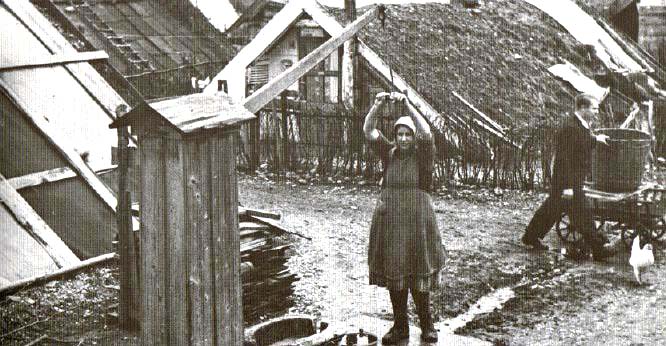
FL Regau Oö (Photo credit BMU)
Photo submitted by Klaus Fohringer
Rehgrund - Am Rehgrund, Graz: Kroistbach ; XI. Mariatrost; British zone;
Reichsgau - For archives, please see
under "Landesarchiv Steiermark, Graz" Karmeliterplatz
Terror im Reichsgau Steiermark 1938-1945
Reiterbauer - Bez. Judenburg
Reittal - Liezen, British zone;
Ried im Innkreis - Team 338, US zone; Ukrainians, Innviertel province,
Camps 701A; 701B; 702 (Eberschw) 710; 802;
Stadtarchiv, A-4910 Ried im Innkreis,
Kirchenplatz 13
Tel. (07752) [0043 7752] 5855 245
Dear Ms. Kaczmar,
My friend Nick Sapsai and I discovered your Web site (Congratulations on a worthy and excellent venture) this evening and would like to tell you about another DP Camp in Austria - to be specific it was named 701A, Reid, Austria. We are working on his autobiography and are trying to find some of his compatriots during the many transitions in his early life. How can we help
you with information about Camp 701A in order to give you useful info for your web citizens? Nick and his family moved to another DP in Austen, Austria before they came to the U.S. in April of 1950. Thank you very much for your efforts. Sincerely, Dave Greene
Ried, rehabilitation centre, formerly Static Centre, Land Upper Austria, US zone;
Sun, Jul 19, 2020
For some years now I have been looking at your website and it has been really helpful to me. You have done a massive job.
I am writing to you as I have just completed a new website which has a lot of photos, reports and information on 5 Displaced Persons Camps, collected by my mother, Clare McMurray/Wositzky.
In 1948-51, my mother worked in several camps in Austria and Trieste and brought with her to Australia photographs, monthly reports, refugee art and handcraft.
I decided that it would be wonderful if this material was accessible to the people or their families who were in the camps at the time - hence I have just put it all on a website.
The camps mum worked in Austria were Eisenerz, Kapfenburg, Reid Rehabilitation Centre, and the YMCA Simmer Camp program in Waiern and Ebanesse.
She also worked in Trieste - in San Sabba, Opincina and Gesuiti. The website has a lot of material from all of these camps.
The link is www.displacedpersoncampcollection.org
Thanking you, Katherine Wositzky katherine.w@optusnet.com.au
Ried, Home for temporarily unaccompanied children, Land Upper Austria,
Riedenberg, L.Salzburg; U.S. Team 338;
Riedenburg - Riedenburg kaserne, Neutorstrasse / Moosstrasse; Stadtteil; US zone; UNRRA Team 317;
Reiterkaserne - camp; Graz; Leonhardstrassa/ Hartenaug.; II. St. Leonhard; British zone;
Roeder - Siezenheim
My parents were at it amongst other freedom fighters in 1956-1958 Hungarian refugees. Please see attached Information.
Eleanor Roosevelt and the Hungarian Freedom Fighters at Camp Roeder in Salzburg, Austria - NARA - 195987.jpg
Kind regards, Rozy Barber toycam88@yahoo.com.au
Roseggerlager - Graz; Roseggerstrasse; /Wac; XV. Wetzelsdorf; 6 barracks 46-52; British zone; 1940 f. Bukowina-Umsiedler (Lager II)
Rosenhain - Graz, III., Geidorf, barracks, British zone;
Rosenthal - Schlaflos; British zone;
Rositten lager, Rosittenkasern, Pferdelazarett - Hungarians; Leopolskron; Rene M. ; (See also Salzburg) - camp photos below
Saltzburg archives.
Archiv der Stadt Salzburg mit Archiv des Salzburger Museums Carolino-Augusteum, Schloss [castle],
Museumsplatz 6,
5010 Salzburg
Dear
Olga,
A short while ago I came across a map of the town of Salzburg
in Austria. I noted, that presently it also contains a streetname
called "ROSITTENGASSE". When in
the year of 1955 I left Salzburg to immigrate to the USA, there was only a place
called Rosittenlager, which also was called Rosittenkaserne or also Pfrerdelazarett
and was the residence of hundreds of displaced people of Hungary, Yugoslavia,
Romania and several other southeastern countries of Europe. These people had
to flee the onrushing Russian Army due to their ethnic heritance going back as
far as two hundred years at this time. But because they either had a Germanic
sounding name or spoke a type of germanic dialect, they were endangerd. I am
enclosing some pictures depicting the back of Barrack No. 13 showing me (left),
my sister and my brother, taken in 1954, and another one below, from 1946, shows
the Schloss Leopoldskron, which was used as the residence of the Von Trapp family
in the Movie "The Sound of Music". I am in the forefront. George
Herzog
The
Old Country
This is my Mom in the picture with me. Her name was Maria Andrejovec and she was born in Slovenia. You asked about the roof of the
house, it was covered with red tiles, which was customary in
these regions. The place I referred to as the "old Country" was
a town by the name of Kernei, also called
Kereny in Hungary and Krnjaja in Yugoslavia. It constantly switched names,
because at one times it was Hungarian, then after World war 1, it became
Yugoslavian and in 1943, was Hungarian again. In the first grade of school,
I learned to count in Yugoslavian, then in second Grade, I was taught the
same in Hungarian. In October, 1944, we were transported by the German army
to Hungary. We finally wound up in a camp in St. Michael, near Graz in
the Steirmark, from where we were transported to Klagengefurt in
Kärnten.
From there we were loaded into a freight train heading north. Near
the town of Bischofshofen in Salzburg, we got stranded till the end
of the war. From there we were taken by the US troops to the Riedenburg Kaserne where
we stayed for a few month. From there we were moved to the Rosittenkaserne which
I described above.
Rosittenkaserne
Photo from Austrian database (www.aeiou.at)
Rothschild Hosp.
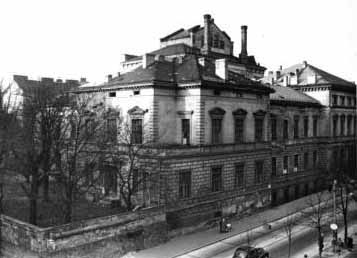
Photo submitted by Klaus Fohringer; Source Yad Vashem.
Rothschild Hopsital - Severingasse, District Al, UNRRA 350, Wien IX
Rothschildspital - Wien, XVIII;
Rottenmann - British zone; on Enns river; camps:
Dörfl
Germaeinschaftslager
Rottenman



